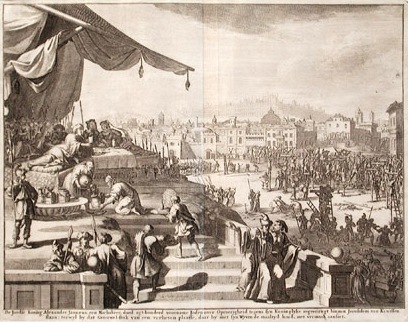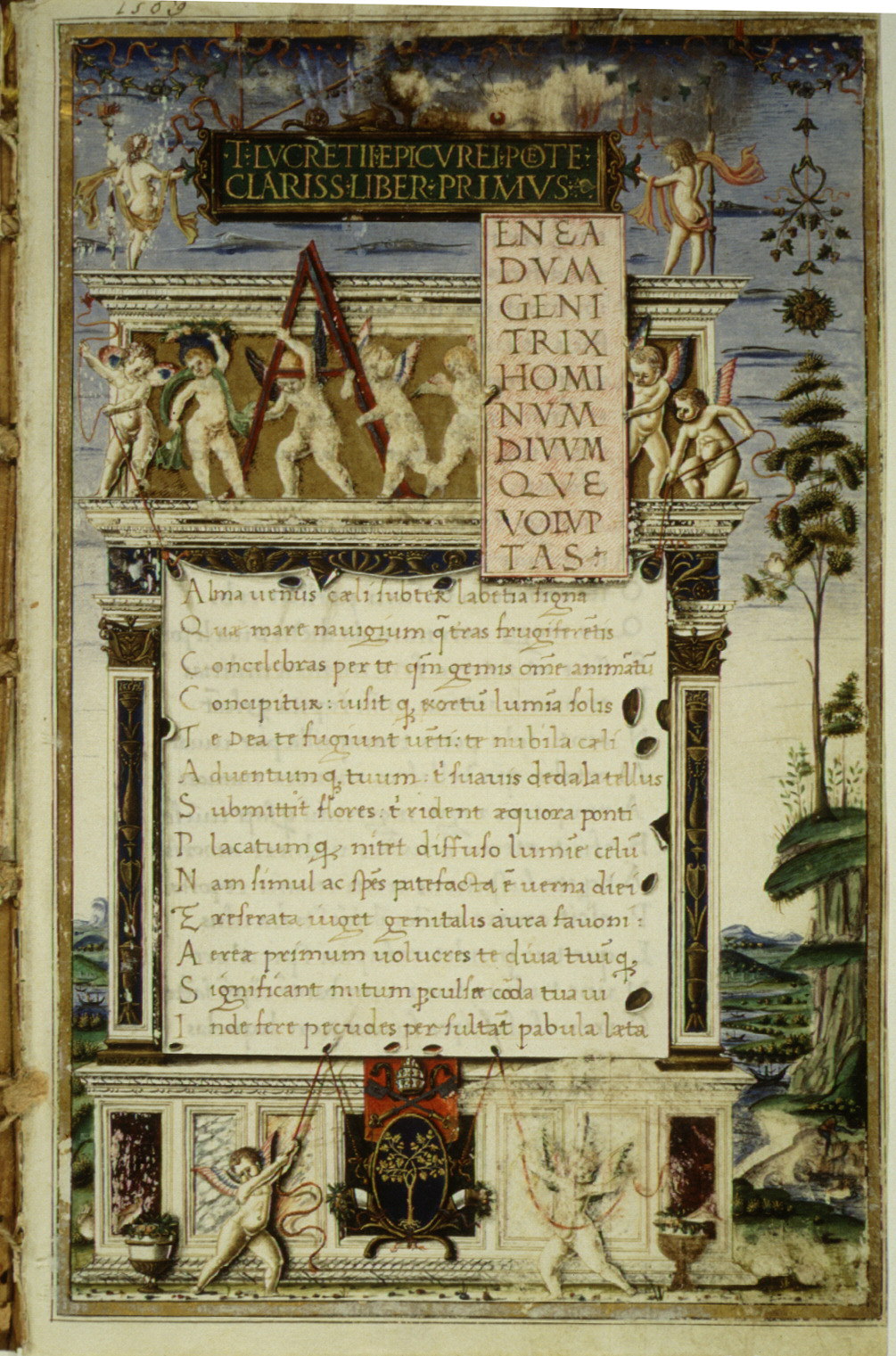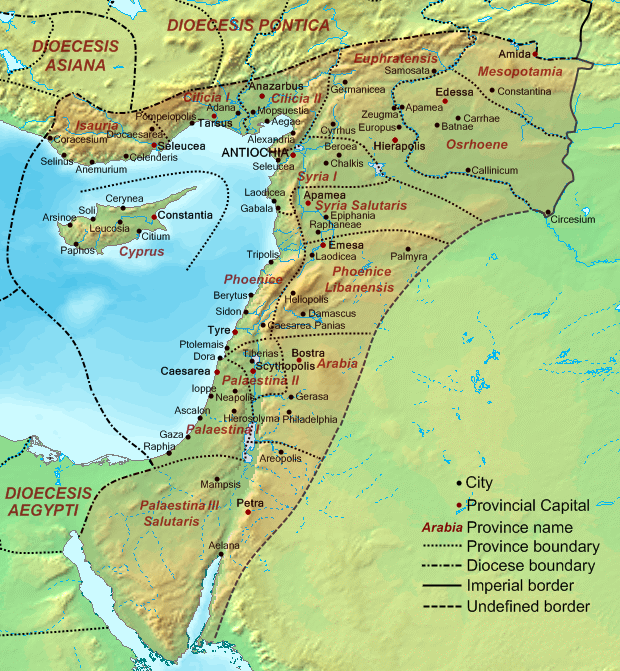|
Gadara
Gadara ( el, Γάδαρα ''Gádara''), in some texts Gedaris, was an ancient Hellenistic city, for a long time member of the Decapolis city league, a former bishopric and present Latin Catholic titular see. Its ruins are today located at Umm Qais, a small town in the Bani Kinanah Department and Irbid Governorate in Jordan, near its borders with Israel and Syria. It stood on a hill above sea level overlooking the Yarmouk River gorge, with the Golan Heights and the Sea of Galilee well visible to the north and northwest. History Gadara was situated in a defensible position on a ridge accessible to the east but protected by steep falls on the other three sides. It was well-watered, with access to the Ain Qais spring and cisterns.. During the Hellenistic and Roman periods, Gadara was a centre of Greek culture in the region, considered one of its most Hellenised and enjoying special political and religious status. Hellenistic period By the third century BC the town was a ... [...More Info...] [...Related Items...] OR: [Wikipedia] [Google] [Baidu] |
Umm Qais
Umm Qais or Qays ( ar, أم قيس , , Mother of Qais) is a town in northern Jordan principally known for its proximity to the ruins of the ancient Gadara. It is the largest city in the Bani Kinanah Department and Irbid Governorate in the extreme northwest of the country, near Jordan's borders with Israel and Syria. Today, the site is divided into three main areas: the archaeological site (Gadara), the traditional village (Umm Qais), and the modern town of Umm Qais. Location Umm Qais is located 28 km north of Irbid and 120 km north of Amman. It expanded from the ruins of ancient Gadara, which are located on a ridge above sea level, overlooking the Sea of Tiberias, the Golan Heights, and the Yarmouk River gorge. Strategically central and located close to multiple water sources, Umm Qais has historically attracted a high level of interest. History Antiquity Gadara was a centre of Greek culture in the region during the Hellenistic and Roman periods. The olde ... [...More Info...] [...Related Items...] OR: [Wikipedia] [Google] [Baidu] |
Meleager Of Gadara
Meleager of Gadara ( grc-gre, Μελέαγρος ; fl. 1st century BC) was a poet and collector of epigrams. He wrote some satirical prose, now lost, and some sensual poetry, of which 134 epigrams survive. Life Meleager was the son of Eucrates, born in the city of Gadara, now Umm Qais in Jordan, which was then a partially Hellenized community noted for its "remarkable contribution to Greek culture". He was educated in Tyre and spent his later life in Cos where he died at an advanced age, perhaps at 70. According to short autobiographical poems he wrote, Meleager was proud of his hometown and identified himself as cosmopolitan, being both "Attic" (i.e. Hellenistic) and Syrian, and also praised Tyre for having "made ima man" and Cos for taking "care of imin isold age". The scholiast to the Palatine manuscript of the ''Greek Anthology'' says he flourished in the reign of Seleucus VI Epiphanes (95 – 93 BC). The uppermost date of his compilation of the Anthology is 60 BC, ... [...More Info...] [...Related Items...] OR: [Wikipedia] [Google] [Baidu] |
Cynicism (philosophy)
Cynicism ( grc, κυνισμός) is a school of thought of ancient Greek philosophy as practiced by the Cynics ( grc, Κυνικοί; la, Cynici). For the Cynics, the purpose of life is to live in virtue, in agreement with nature. As reasoning creatures, people can gain happiness by rigorous training and by living in a way which is natural for themselves, rejecting all conventional desires for wealth, power, and fame, and even flouting conventions openly and derisively in public. Instead, they were to lead a simple life free from all possessions. The first philosopher to outline these themes was Antisthenes, who had been a pupil of Socrates in the late 400 BC. He was followed by Diogenes, who lived in a ceramic jar on the streets of Athens. Diogenes took Cynicism to its logical extremes, and came to be seen as the archetypal Cynic philosopher. He was followed by Crates of Thebes, who gave away a large fortune so he could live a life of Cynic poverty in Athens. Cynicism g ... [...More Info...] [...Related Items...] OR: [Wikipedia] [Google] [Baidu] |
Alexander Jannaeus
Alexander Jannaeus ( grc-gre, Ἀλέξανδρος Ἰανναῖος ; he, ''Yannaʾy''; born Jonathan ) was the second king of the Hasmonean dynasty, who ruled over an expanding kingdom of Judea from 103 to 76 BCE. A son of John Hyrcanus, he inherited the throne from his brother Aristobulus I, and married his brother's widow, Queen Salome Alexandra. From his conquests to expand the kingdom to a bloody civil war, Alexander's reign has been generalised as cruel and oppressive with never-ending conflict. The major historical sources of Alexander's life are Josephus's ''Antiquities of the Jews'' and '' The Jewish War''. The kingdom of Alexander Jannaeus was the largest and strongest known Jewish State outside of biblical sources, having conquered most of Palestine's Mediterranean coastline and regions surrounding the Jordan River. Alexander also had many of his subjects killed for their disapproval of his handling of state affairs. Due to his territorial expansion and inte ... [...More Info...] [...Related Items...] OR: [Wikipedia] [Google] [Baidu] |
Philodemus Of Gadara
Philodemus of Gadara ( grc-gre, Φιλόδημος ὁ Γαδαρεύς, ''Philodēmos'', "love of the people"; c. 110 – prob. c. 40 or 35 BC) was an Arabic Epicurean philosopher and poet. He studied under Zeno of Sidon in Athens, before moving to Rome, and then to Herculaneum. He was once known chiefly for his poetry preserved in the '' Greek Anthology'', but since the 18th century, many writings of his have been discovered among the charred papyrus rolls at the Villa of the Papyri at Herculaneum. The task of excavating and deciphering these rolls is difficult, and work continues to this day. The works of Philodemus so far discovered include writings on ethics, theology, rhetoric, music, poetry, and the history of various philosophical schools. Ethel Ross Barker suggested in 1908 that he was owner of the Villa of the Papyri Library. Life Philodemus was born c. 110 BC, in Gadara, Coele-Syria (in present-day Jordan).Blank, David"Philodemus" The Stanford Encyclopedia of Philosophy ... [...More Info...] [...Related Items...] OR: [Wikipedia] [Google] [Baidu] |
Greek Anthology
The ''Greek Anthology'' ( la, Anthologia Graeca) is a collection of poems, mostly epigrams, that span the Classical and Byzantine periods of Greek literature. Most of the material of the ''Greek Anthology'' comes from two manuscripts, the '' Palatine Anthology'' of the 10th century and the ''Anthology of Planudes'' (or ''Planudean Anthology'') of the 14th century.: Explanatory text for the book of W. R. Paton entitled "The Greek Anthology with an English Translation" (1916), the same text is also at the introduction in page http://www.ancientlibrary.com/greek-anthology/ before the facsimile copy of the pages of the same book] The earliest known anthology in Greek was compiled by Meleager of Gadara in the first century BC, under the title ''Anthologia'', or "Flower-gathering." It contained poems by the compiler himself and forty-six other poets, including Archilochus, Alcaeus, Anacreon, and Simonides. In his preface to his collection, Meleager describes his arrangeme ... [...More Info...] [...Related Items...] OR: [Wikipedia] [Google] [Baidu] |
Menippus
Menippus of Gadara (; el, Μένιππος ὁ Γαδαρεύς ''Menippos ho Gadareus''; fl. 3rd century BC) was a Cynic satirist. The Menippean satire genre is named after him. His works, all of which are lost, were an important influence on Varro and Lucian, who ranks Menippus with Antisthenes, Diogenes, and Crates as among the most notable of the Cynics. Life Little is known about the life of Menippus. He was a Greek, perhaps of Phoenician descent from the Greek city of GadaraBlank, David"Philodemus" The Stanford Encyclopedia of Philosophy (Spring 2019 Edition), Edward N. Zalta (ed.), accessed 3 June 2020. in Coele-Syria.Strabo's Geographybr>16.2.29/ref> The ancient sources agree that he was a slave. He was in the service of a citizen of Pontus, but in some way obtained his freedom and relocated to Thebes. Diogenes Laërtius relates a dubious story that he amassed a fortune as a money-lender, lost it, and committed suicide. Writings His works (written in a mixture of ... [...More Info...] [...Related Items...] OR: [Wikipedia] [Google] [Baidu] |
Irbid Governorate
Irbid or Irbed ( ar, إربد) is a governorates of Jordan, governorate in Jordan, located north of Amman, the country's capital. The capital of the governorate is the city of Irbid. The governorate has the second largest population in Jordan after Amman Governorate, and the highest population density in the country. History Iron Age During the Iron Age, the region around Irbid, known then as Gilead, was settled by the Israelites. Ar-Ramtha, the second largest city in the Irbid Governorate, is commonly identified with the Israelite city of Ramoth-Gilead, a Levitical city and city of refuge east of the Jordan River, mentioned several times in the Hebrew Bible. By the late Iron Age, Gilead became the focus of a power struggle between the Kingdom of Israel (united monarchy), Kingdom of Israel and the Arameans, Aramean kingdom of Aram-Damascus. According to the 4 Kings, Book of Kings, Ramoth-Gilead was the location of a battle between Kingdom of Israel (Samaria), Kingdom of Israel ... [...More Info...] [...Related Items...] OR: [Wikipedia] [Google] [Baidu] |
Epicureanism
Epicureanism is a system of philosophy founded around 307 BC based upon the teachings of the ancient Greek philosopher Epicurus. Epicureanism was originally a challenge to Platonism. Later its main opponent became Stoicism. Few writings by Epicurus have survived. However, there are independent attestations of his ideas from his later disciples. Some scholars consider the epic poem ''De rerum natura'' (Latin for ''On the Nature of Things'') by Lucretius to present in one unified work the core arguments and theories of Epicureanism. Many of the scrolls unearthed at the Villa of the Papyri at Herculaneum are Epicurean texts. At least some are thought to have belonged to the Epicurean philosopher Philodemus. Epicurus also had a wealthy 2nd-century AD disciple, Diogenes of Oenoanda, who had a portico wall inscribed with tenets of the philosophy erected in Oenoanda, Lycia (present day Turkey). Epicurus was an atomic materialist, following in the steps of Democritus. His mate ... [...More Info...] [...Related Items...] OR: [Wikipedia] [Google] [Baidu] |
Epicurean
Epicureanism is a system of philosophy founded around 307 BC based upon the teachings of the ancient Greek philosopher Epicurus. Epicureanism was originally a challenge to Platonism. Later its main opponent became Stoicism. Few writings by Epicurus have survived. However, there are independent attestations of his ideas from his later disciples. Some scholars consider the epic poem '' De rerum natura'' (Latin for ''On the Nature of Things'') by Lucretius to present in one unified work the core arguments and theories of Epicureanism. Many of the scrolls unearthed at the Villa of the Papyri at Herculaneum are Epicurean texts. At least some are thought to have belonged to the Epicurean philosopher Philodemus. Epicurus also had a wealthy 2nd-century AD disciple, Diogenes of Oenoanda, who had a portico wall inscribed with tenets of the philosophy erected in Oenoanda, Lycia (present day Turkey). Epicurus was an atomic materialist, following in the steps of Democritus. His ma ... [...More Info...] [...Related Items...] OR: [Wikipedia] [Google] [Baidu] |
Decapolis
The Decapolis (Greek: grc, Δεκάπολις, Dekápolis, Ten Cities, label=none) was a group of ten Hellenistic cities on the eastern frontier of the Roman Empire in the Southern Levant in the first centuries BCE and CE. They formed a group because of their language, culture, religion, location, and political status, with each functioning as an autonomous city-state dependent on Rome. They are sometimes described as a league of cities, although some scholars believe that they were never formally organized as a political unit. The Decapolis was a center of Hellenistic and Roman culture in a region which was otherwise populated by Jews, Nabataeans and Arameans. In the time of the Emperor Trajan, the cities were incorporated into the provinces of Syria and Arabia Petraea; several cities were later placed in Syria Palaestina and Palaestina Secunda. Most of the Decapolis region is located in modern-day Jordan, except Hippos and Scythopolis (in Israel), Canatha and Damascus ( ... [...More Info...] [...Related Items...] OR: [Wikipedia] [Google] [Baidu] |
Yarmouk River
The Yarmuk River ( ar, نهر اليرموك, translit=Nahr al-Yarmūk, ; Greek: Ἱερομύκης, ; la, Hieromyces or ''Heromicas''; sometimes spelled Yarmouk), is the largest tributary of the Jordan River. It runs in Jordan, Syria and Israel, and drains much of the Hauran plateau. Its main tributaries are the wadis of 'Allan and Ruqqad from the north, Ehreir and Zeizun from the east. Although it is narrow and shallow throughout its course, at its mouth it is nearly as wide as the Jordan, measuring thirty feet in breadth and five in depth. The once celebrated Matthew Bridge used to cross the Yarmuk at its confluence with the Jordan. History Yarmuk forms a natural border between the plains to the north - Hauran, Bashan and Golan - and the Gilead mountains to the south. Thus it has often served as boundary line between political entities. Neolithic The Yarmukian is a Pottery Neolithic culture that inhabited parts of Palestine and Jordan. Its type site is at Sha'ar HaGolan, ... [...More Info...] [...Related Items...] OR: [Wikipedia] [Google] [Baidu] |









